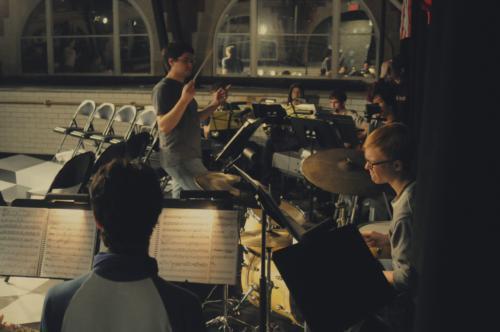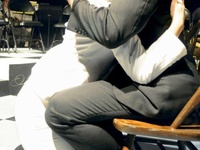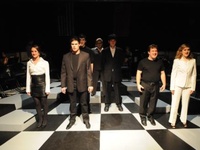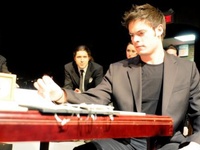Romance, drama, espionage, ABBA, and...chess? The 1986 rock musical “Chess” features all of the above and the Murray Head hit “One Night in Bangkok.” The brainchild of Tim Rice and ABBA’s Björn Ulvaeus and Benny Andersson, a Harvard production directed by Sean P. Bala ’09 will run through Dec. 7 in the Adams House Pool Theatre. The musical adds intrigue to what might seem like just another high-intensity, mind-boggling (or, to some, simply boring) game by using its namesake as a launch-pad to explore much deeper issues of identity in the Cold War.
Over the years, the musical has evolved from a typical rock opera into the increasingly play-like format used by Bala. According to the director, this production of “Chess” features a more fully developed plotline and fleshed-out characters. “The characters have strong emotional depth,” Bala says. “There are no good guys or bad guys, just moral ambiguities. It’s a smart musical.”
“Chess” is set at the World Chess Championship in Bangkok and focuses on the title game between Russian champion Anatoly Sergievsky and American challenger Freddie Trumper. The plot is loosely based on the 1972 World Chess Championship battle between chess phenoms Victor Korchnoi and Bobby Fischer. “Chess” chronicles the competition and the politics that run parallel to the match, as well as a romantic plot involving Trumper’s second, Florence Vassy, and Sergievsky. Suddenly, chess isn’t so straightforward, and the characters become pawns in a game with mysterious players. Despite the title of the musical, “Chess really ends up taking a backseat to the international intrigue and romance,” Bala says.
Amid the romance and competition, political tensions stemming from the Cold War are a constant presence. “Characters are confronted with identity issues, the question of, ‘Can you really be independent in these times?,’ and the feeling that any day [the War] could end,” Bala says. “It’s hard for our generation to understand 20 years out, but now is a particularly good time to start taking stock of these things and the legacy of the Cold War.”
This production of “Chess” forgoes flashy costumes and big dance numbers in favor of a more humanizing view of the characters, making the themes of the musical more resonant. “[‘Chess’ is] much more about the music and the issues, not the spectacle,” says production manager Jenny D. Wanger ’09.
The space constraints of the intimate Pool Theatre also influenced this decision to transform the musical from a large-scale, flashy production to what Bala describes as a “semi-stage concert,” where the ensemble remains on stage for the entirety of the show, clutching songbooks. Yet another element of the musical affected by space is the orchestra, which now consists of a 10-piece ensemble rather than the original, which demanded at least 25 musicians. “One of the challenges and the joys was condensing the score while keeping the diverse textures of the music intact,” says musical director Joshua R. Stein ’09-’10, a former Crimson Editorial writer. “The show runs the gamut musically. It features everything from ’80s style rock to pop to ballads to heart wrenching duets and an eight-minute long finale.”
This production of “Chess” has attempted to do more than the stereotypical rock musical (think “We Will Rock You”). Bala hopes to appeal to a broader audience looking for an intelligent and engaging musical.
“The list of rock musicals is very short,” Wanger says. “The list of musicals that deal with political issues realistically is short too. The intersection of the two is even shorter; it’s really only this show.”
Read more in Arts
SPOTLIGHT: Jeremy R. Steinemann '08
















